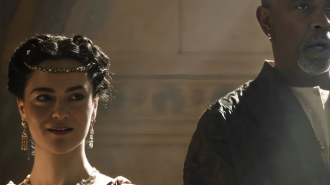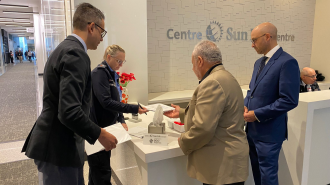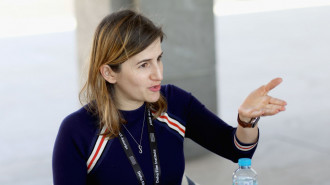
Loud cries for Ukraine, muted responses for Gaza: A look at Christian denominations' mixed reactions to Israel's war on Gaza

The global reactions from Western countries to the Gaza conflict have varied widely, leading to accusations of double standards.
The West's response to Gaza differs greatly from its approach to other global crises, raising questions about why these differences exist.
A particular concern is the mixed responses from various Christian denominations, which have made inconsistent statements, leading to doubts about the credibility of their calls for justice and peace.
To clarify their positions ten months into the conflict, The New Arab has gathered responses from three different Christian denominations to assess their current stances.
Eastern Orthodox Church’s loud cries for Ukraine, but silence on Gaza
The Eastern Orthodox Church, which has around 230 million followers worldwide, has been vocal in condemning Russia's assault on Ukraine. Church leaders issued strong statements against the invasion, urging peace and solidarity with the Ukrainian people.
However, the Church has been notably silent on the Gaza conflict, leading to criticism. When asked about this, Church officials stated that the institution "is not a political organisation and does not engage in political issues around the world."
This stance has provoked criticism from within the Church. An Eastern Orthodox Bishop, speaking anonymously, criticised the Church for prioritising political interests over Christ’s teachings about Gaza.
He remarked, "There are double standards within the Church." Reflecting on the Church’s strong condemnation of Russia, he added, "The Church is serving political interests. It is tragic."
The Bishop went on to express disappointment and highlighted the growing discontent within the Church over its silence on the Gaza conflict.
"This is not in line with Christ's teachings. We should support Gaza not just as Christians or as churches, but as human beings," he added.
The Bishop concluded, "They have abandoned Christ," referencing Jesus' words: "When you refused to help the least of these my brothers and sisters, you were refusing to help me."
Church of England's shift after ten months
Following the October 7 attack, the Church of England and its leader, Archbishop of Canterbury Justin Welby, repeatedly condemned Hamas and expressed deep sorrow over the "abhorrent terrorist attacks" in Israel.
Archbishop Welby described the violence as "evil in its most extreme form" and emphasised the Church’s solidarity with Israel during this time.
This stance angered Palestinian Christians in the occupied West Bank, who criticised the Archbishop for failing to fully condemn Israel’s ongoing occupation and heavy bombing of Gaza.
Their frustration grew after Welby visited Jerusalem, which was intended to show support for the Christian community following the bombing of the Anglican-run Al-Ahli Hospital in Gaza City — a bombing that Palestinian authorities have blamed on Israel.
During his visit, Welby met with various church leaders, including Greek Orthodox Patriarch Theophilus III, shortly after Israel bombed the Greek Orthodox Church of Saint Porphyrius.
Despite these meetings, many felt that Welby’s statements fell short of condemning Israel’s actions. Instead, he criticised those participating in demonstrations calling for a ceasefire, suggesting they should "cry out against" the October 7 attack.
He went further by accusing those who did not of perpetuating "blood libel," a move that some, like Stephen Sizer, a prominent priest in the Church of England, see as prioritising the Church’s relationship with pro-Israel groups over standing up for moral principles.
Sizer also argued that the Church has not genuinely supported Palestinians, noting that it has not condemned Israel's attacks on civilians or called for a ceasefire.
Instead, it has emphasised Israel’s "right to defend itself," which Sizer claims is legally incorrect. According to international law, he argues, an occupying power like Israel does not have this right, whereas Palestinians do have the right to defend themselves and resist occupation.
Interestingly, despite its initial stance, the Church of England eventually condemned Israel’s actions, though it took ten months to do so.
On August 3, Archbishop Welby issued a statement saying that Israel must end its occupation of Palestinian territories. He supported the International Court of Justice’s opinion, which declared Israel’s occupation "unlawful" and described its policies in the West Bank as "apartheid."
In this statement, Welby acknowledged that for decades, Israel has denied Palestinians "dignity, freedom, and hope." He called on governments worldwide to uphold international law, pointing out Israel’s ongoing seizure of Palestinian land, restrictions on access to resources, and the military rule that deprives Palestinians of safety and justice.
This marked a significant shift in the Church’s position, showing a stronger condemnation of Israel’s actions and a recognition of the struggles faced by Palestinians under occupation.
Catholic Church's recognition of Israel's war as terrorism
In stark contrast, Pope Francis has strongly condemned Israel's actions in Gaza, calling them terrorism. In a November 2023 speech, he said, "Here we've gone beyond war. This isn't war anymore; this is terrorism."
The Catholic Church reports that the Pope continues to get troubling updates from Gaza, where unarmed civilians are being targeted by bombings and gunfire.
In response to the ongoing violence, over 140 church leaders from around the world signed a letter in March 2024. The letter called for peace and an end to the killing in Gaza.
It specifically highlighted the suffering of Palestinians, including Palestinian Christians, and called for a comprehensive and permanent ceasefire.
"As the ongoing devastation, bombing, and ground invasion in Gaza continue, Palestinians, including our Palestinian Christian siblings, cry out to the world, asking, 'Where are you?' We say, 'Enough killing!' and together demand a comprehensive and permanent ceasefire," says the letter.
However, the Eastern Orthodox Church and the Church of England did not sign the letter.
Condemned yet still abandoned
Despite efforts to condemn Israel's war on Gaza, Palestinian Christians still feel abandoned.
Rifaat Kassis, chairman of Kairos, a Christian Palestinian movement, expressed to The New Arab the frustration felt by many Palestinian Christians. He pointed out that the silence of 15 of the 18 local churches in Palestine can be attributed to their fear of retribution from Israel.
"We, as Palestinian Christians, observe a troubling double standard," Rifaat said. "While the world’s churches condemned Russia within two weeks of the invasion of Ukraine, they have yet to denounce Israel's actions after ten months of ethnic cleansing in Gaza."
He emphasised the deep connection between the Orthodox Church and the region, describing it as "our mother church in Palestine."
Rifaat asserted, "Palestine is the Holy Land, and Palestinian Christians are the guardians of Christianity. We are the ones ensuring that the churches in the Holy Land do not become mere museums."
Rifaat warned that the Orthodox Church must heed the plight of Palestinian Christians or risk their extinction.
"This is Christ's land," he declared. "The world's churches must now turn their attention here."
He also expressed the strong sense of abandonment felt by Gaza’s Christian residents, highlighting that "even the laws and rules of war have been cast aside in Gaza, and human dignity is no longer respected."
Rifaat called on European churches to take a stand, urging them not only to condemn what he described as genocide in Gaza but also to "sever ties with Israel."
He argued that "churches cannot afford to leave such matters to politicians alone."
"When ethnic cleansing is happening," Rifaat concluded, "it transcends politics; it is the slaughter of human beings. If the church does not stand with the victims and the weak, what is its purpose?"
Salwa Amor is an independent documentary maker. Most recently she was one of the producers of the award-winning BBC Panorama two-part series 'Children of Syria'






 Follow the Middle East's top stories in English at The New Arab on Google News
Follow the Middle East's top stories in English at The New Arab on Google News


